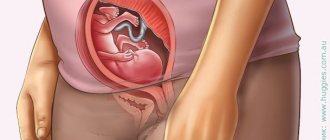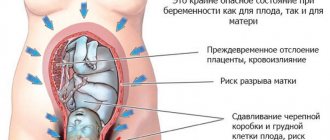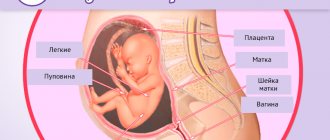From the 28th week, visits to the gynecologist become commonplace, the gynecological chair no longer evokes almost any emotions, however, it becomes increasingly difficult to climb onto it.
The organs and systems of the fetus have matured so much that if suddenly for some reason he wants to be born, doctors will be able to help him survive
Fetal development
Receiving all the necessary nutrients through the placenta, the baby gains weight every week. The skin smoothes out, becomes soft, and accumulates more and more pigment.
This is what your baby looks like at 28 weeks
Eyelashes lengthen and become fluffier. The hair on the head becomes longer and thicker, in addition, a pigment begins to be synthesized that colors it. The baby loses its transparency and colorlessness. Toenails and fingernails approach the edge of the fingers.
The formation of muscles is completed, muscle strength increases, which the mother cannot help but notice from the intense movements of the child. The formation of the skeletal system also ends. Next, the bones will accumulate calcium and harden.
Maturation processes in the lungs continue.
The structures of the central nervous system mature - there are more cells in the cerebral cortex, convolutions and grooves are formed. The centers responsible for taste and sound perception are activated. The formation of sucking and grasping reflexes occurs (the baby is already sucking his thumb and tugging at the umbilical cord with his hands). Already this week, the fetus becomes aware of its native language.
Well-being at 28 weeks of pregnancy
How you feel at 28 weeks of pregnancy can be different for every woman. At this time, the belly is actively growing, and the baby’s endocrine system is nearing completion. The baby can already feel the light through the mother's belly. Ultrasound shows eyelashes and facial contours. During epidemics, a woman at 28 weeks of pregnancy may have a fever, but in this case it is important to immediately consult a physician and not use potent medications for treatment. It is not advisable for a woman to catch a cold or get sick at all during pregnancy, since she bears double responsibility for herself and the baby. If you have a cold, you should use folk remedies with caution and seek the support of medical professionals.
Ultrasound at 28 weeks of pregnancy
A woman is sent for an ultrasound examination at the 28th week only if indicated, or if for some reason she did not have time to do it earlier. In this case, all measurements included in the research protocol are performed.
If the screening took place earlier, then at this time the main dimensions of the fetus are determined, indicating whether its development corresponds to the gestational age, its position in the uterus, the amount and condition of amniotic fluid, the size and degree of maturity of the placenta are assessed.
As a rule, by the 28th week the fetus is located in the uterus as it plans to be born. Most often, head down. If a transverse, oblique or breech presentation is detected, the woman may be prescribed exercises to help the baby roll over. If it is not possible to “convince” him, the woman will most likely have to give birth by caesarean section.
Fetus at 28 weeks of gestation
Now the baby already has good hearing, has learned to see and touch. It can distinguish the taste of amniotic fluid, and therefore, after eating, the expectant mother may notice increased activity of the child.
Hemoglobin A appeared in the fetal blood, which is characteristic of an adult. At the moment, its quantity is quite low, but will increase over time.
During development, growth of endocrine glands and myelination of nerve fibers can be noted.
It can be noted that the child has now developed his own routine, which the mother can notice. During the day he sleeps, and in the evening he begins vigorous activity.
However, now the baby only experiences REM sleep. The child sleeps most of the day, waking up occasionally. He will develop slow-wave sleep only by the 30th week of pregnancy.
At this stage, it is already possible to determine which brain hemisphere predominates in the baby and prepare for this in advance. The formation of the centers of perception and reproduction occurs.
The child’s height is already about 39 cm, weight is slightly more than 1 kg. He looks like a normal baby, but is too thin, and his respiratory system is still developing.
The child is already opening his eyes, and at this stage they are often blue. They will acquire their final color only a few months after birth.
With premature birth at this stage of life, the baby is not in danger, but signs of prematurity remain noticeable: it is covered with lanugo (the baby’s hair in the womb, which falls off over time), nails and cartilage tissue are not fully developed. The respiratory system is already functioning, but is also not mature.
What happens in your body at 28 weeks?
All changes are expected - you continue to gain weight.
The child is growing and the uterus is increasing in size; now it is located at a distance of 28 cm from the symphysis pubis. This arrangement greatly complicates the process of breathing and digestion. To inhale, a woman needs to make more and more effort. Eating even a small amount of food causes a feeling of fullness in the stomach, heartburn is difficult to correct, and constipation has become almost the norm.
The breasts continue to fill, the amount of colostrum increases.
Hormones do not always have a positive effect on the skin; it becomes dry, which further contributes to the appearance of stretch marks on the hips, chest and abdomen. In addition to being an aesthetic problem, stretch marks also cause a feeling of constant itching. Scratching and infection should be avoided.
The double load on the kidneys leads to disruption of their function and the appearance of edema.
A large uterus disrupts the venous outflow in the pelvic area, which leads to varicose veins in the genital area. And constipation contributes to the appearance of cracks in the anal area.
The impact of ARVI on a child
As is known, infection in the early stages leads to the development of defects in the fetus; in the worst case, when the situation gets out of control, this can cause the death of the child. In the second and third trimesters, this danger is less, but there is still a risk that the baby will not be born completely healthy. Colds at week 28 can lead to:
- The birth of a child with signs of ARVI: pale skin, weakness and lethargy.
- Disruption of the fetal respiratory system.
- Fetal hypoxia.
- Premature birth.
- Threat of miscarriage.

ARVI can cause fetal hypoxia and also cause the development of malformations in the child
Don't ignore the first signs of a cold, even if it's just a sore throat or a slight runny nose. You must immediately take appropriate measures, and then you will not be afraid of any consequences.
There is also no need to panic when signs of illness appear, because stress itself is dangerous for mother and child. You need to calm down, collect your thoughts and seek medical help, where they will tell you the safest and most effective ways to get rid of the disease.
How you feel at 28 weeks
The woman's condition can be assessed as rather satisfactory. During a normal pregnancy, unpleasant sensations such as heartburn, constipation, back pain, and heaviness in the legs are of little concern to the expectant mother. Most likely, you have already become accustomed to them and have come to terms with them.
Now all attention is paid to the child - if everything is fine with him, the expectant mother is ready to endure a lot. You should note any changes in the baby's behavior (decrease or increase in activity), monitor discharge, and the tone of the uterus.
Sometimes training contractions appear - the tone of the uterus increases, it becomes hard, then relaxes. The condition should not be repeated more than 10 times a day, and its duration should not exceed 2 minutes.
Abdomen at 28 weeks of pregnancy: pain
Do not ignore abdominal pain at this time, as this may indicate certain problems. But do not be alarmed if the pain is nagging or stabbing and occurs periodically, more often when changing body position. This type of pain occurs when the ligaments are stretched and softened.
Aching pain localized in the lower abdomen may indicate a malfunction of the digestive system. It can also be accompanied by flatulence, constipation, colitis and dysbacteriosis.
Pain due to strong pushes and kicks from the baby, which is localized in the hypochondrium area, is also normal.
If the pain in the hypochondrium is more dull and aching, occurring several hours after eating, accompanied by a bitter belch, it may indicate the development of gallstone cholecystitis.
Pronounced severe pain in the lower abdomen may indicate premature placental abruption. Also at this moment, a woman may observe bloody discharge from the vagina. In some cases, a pregnant woman may not experience spotting due to internal bleeding, and the pain may be so intense that it is almost impossible to touch the abdomen.
Acute pain in the lower abdomen also occurs during premature birth. They can be incipient, incipient, threatening. The pain, most often aching, can radiate to the lower back. If this is nothing more than premature birth, then the pain becomes cramping and regular. Along with the pain, the woman observes the discharge of amniotic fluid.
Premature birth most often occurs in women who have any gynecological diseases or uterine malformations. If a pregnant woman experiences severe toxicosis during this period, this is also a risk factor.
Pain should not always cause panic in a pregnant woman. Spasms of the digestive organs can cause aching pain localized in the lower abdomen. This may be colitis and dysbacteriosis.
Discharge from the genital tract
The norm for discharge at this stage of pregnancy is light, moderate, liquid discharge with a subtle sour odor.
Any change in the color, smell or consistency of the discharge may indicate the development of pathology. Green and yellow with an unpleasant odor indicate the development of an infection. Bright red or brown appear when there is a threat of premature birth or placental abruption.
Deviation in any direction should be a reason to seek medical help
Discharge at 28 weeks of pregnancy
Leucorrhoea during pregnancy is normal. But what should they normally be? A milky or grayish tint with a sour smell is acceptable. It is worth paying attention if they change color towards a yellowish, greenish, purulent or other unpleasant shade.

Frequent walks will help prepare your body for childbirth.
The consistency of normal discharge should be uniform. If there is an inflammatory process or infection in the body, the leucorrhoea becomes cheesy and may bubble or form clots. The external genitalia may become red, with severe itching and discomfort (burning).
A dangerous symptom is the appearance of bloody or brownish discharge. Very often this is a sign of fetal presentation or placental abruption. The discharge has a very different character: abundant, scarlet in color, spotting.
In addition to the above problems, the threat of premature birth is not uncommon. Each of the above symptoms is accompanied by an unpleasant, nagging pain in the lower abdomen. All you need to do is urgently call an ambulance and wait for it in a lying position.
If a woman begins to leak amniotic fluid, transparent or slightly yellowish marks appear on her underwear. It doesn’t matter if it’s a few drops or a stream - the algorithm of actions is the same - lie down and call for medical help. If you have personal transport, ask your loved ones to take you to the hospital.
Photos of bellies at 28 weeks
Tests at 28 weeks
The time for maternity leave begins at 27–28 weeks of pregnancy. From now on, you need to visit the gynecologist more often. Ultrasounds are often not done at this stage. During the appointment, the doctor listens to the fetal heartbeat, notes the woman’s blood pressure and weight on the chart, and measures the circumference of the abdomen and pelvis. You should still undergo standard pregnancy tests - urine and blood. But there are some other indicators, the values of which need to be clarified in the 3rd trimester.
Blood tests that should be taken:
- for sugar;
- for antibodies.
Diabetes mellitus may occur during pregnancy. This is why blood sugar levels are so necessary. To prevent anemia from developing, the level of iron in the body is monitored.
An antibody test will reveal the Rh factor. And also the presence or absence of Rh conflict with the child, which can affect the outcome of the birth. If necessary, a special medicine is administered that will prevent the formation of antibodies to the child’s blood in the mother’s body.
Examinations at 28 weeks
If you are scheduled to appear at the antenatal clinic at this time, then, most likely, the doctor will recommend such control tests as a general urine test, a general blood test, and an antibody titer with a negative Rh factor. In addition, according to indications, smears will be taken for flora and culture will be performed.
It is mandatory to measure the abdominal circumference and the height of the uterine fundus, blood pressure in both arms and the weight of the pregnant woman with an assessment of the increase throughout the pregnancy and since the last weighing.
Feelings at 28 weeks of pregnancy
The main sensation at this stage is the baby moving. The baby is becoming more and more active, pushing, tumbling, and playing in mommy’s belly. His movements are a sign that development is occurring normally, there are no deviations or problems. In addition, this is important for the woman herself - listening to the baby’s kicks, she calms down and does not worry.
According to doctors' recommendations, you need to record the baby's movements, at least in the morning and evening. Many mothers point out that it is in the evening (night) time of day that the belly becomes most active.
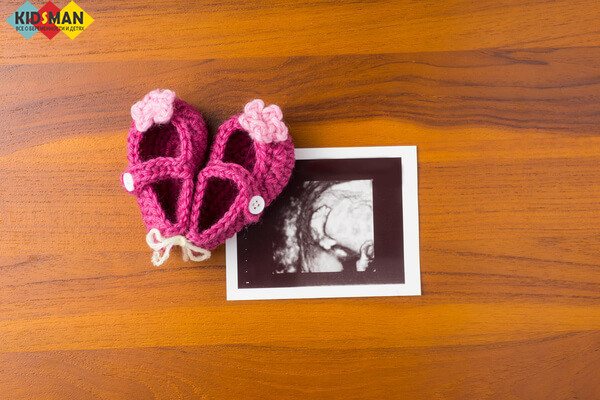
The ultrasound image clearly shows the baby and its gender
During the day, he is lulled by steady rocking in his tummy, but after the woman assumes a lying position, he begins to play. Of course, not only because of the woman’s desire to lie down, the child begins to move. There are some other reasons for this:
- eating, snacking;
- increased blood sugar;
- a jump in adrenaline levels - in response to a stressor or nerves.
Remember that every little one is individual, you shouldn’t fit your child into someone else’s framework - it’s a matter of temperament, character, genetics. On average, a baby makes about 10 movements every 10 minutes.
But we shouldn’t forget about the regime he developed: sometimes a belly-dweller can sleep for a long time, waking up in the afternoon. Don’t worry or worry - just try to lie down: this is sometimes more reliable than an ultrasound in waking up a little person.
A cause for concern may be the absence of movements throughout the day - then it is better to immediately consult a doctor.
Pain
Due to the softening of the ligaments and joints that support the rapidly growing uterus, a displaced center of gravity, a woman may experience unpleasant pain in the lumbar and back areas.

Lower back pain is not a big deal
The 28th week of gestation is quite noticeable for a pregnant woman - the stomach has increased significantly, walking is uncomfortable, and it is very difficult to find a suitable position for sleeping. It is worth distinguishing between the nature of the pain: aching, radiating to the thigh or leg, which does not intensify - due to the pressure of the growing uterus on the sciatic nerve.
The sensations are quite tolerable, they pass, as they arise, on their own. If it is a sharp, shooting, cramping pain localized in the lower back, call an ambulance; this is often a sure sign of impending labor.
There should be no abdominal pain during normal pregnancy. From time to time, there may be pressure under the ribs or other quickly arising and disappearing unpleasant sensations - this is the work of your baby.
And if there is a dull pain in the hypochondrium, which can occur after eating, does not stop for a long time and “pulls the stomach” - consult a doctor. Such symptoms are characteristic of gallstone cholecystitis.
A common problem for all pregnant women is swelling. Every woman expecting a child has experienced the appearance of edema to one degree or another. Often their cause can be poor nutrition: a lot of salty or smoked foods, fried, spicy foods.

Think carefully about your diet
It is worth remembering that such a diet will not lead to anything good, because fluid is retained in the body, disrupting the water balance. If the swelling is severe, do not hesitate - seek medical help. With such symptoms, a serious disease can develop - gestosis.
Control your body weight, drink less water (include first courses, tea, compote, etc. in the 2 liters of liquid allowed per day). Monitor the amount of urine that is released when you go to the toilet: it should be much more than you drank during the day.
Weight
The norm for weight gain during the 7th month of pregnancy is 50 g per day. Each week, weight gain should not exceed 500 g! In general, it is acceptable to gain 8–10 kg during this period.
Don’t let everything take its course, weigh yourself, control this issue. You need to remember that extra pounds will negatively affect your condition and lead to complications during childbirth.

Better to eat homemade food
Nutrition
The diet is no different from previous weeks - the main thing is to provide the baby with all the necessary microelements. In order for the menu to fully meet the needs of the expectant mother and baby, without the woman gaining weight, the nutrition needs to be developed with the help of nutritionists.
At week 28 you need to eat in small portions, about 6 times a day. 3000 calories per day is optimal for satiety and well-being of a pregnant woman. Important: the larger amount should be in the first half of the day!
Products should be varied. Pay special attention to fresh vegetables and fruits - vitamin complexes that a woman must take are not comparable to plant foods. It is rich in fiber, which “calms” intestinal motility.
Saturate your food with complex carbohydrates - they take a long time to digest, normalize digestion and do not cause an increase in glucose levels. In addition, the advantage is the effect of satiating the stomach, which does not allow the appetite to run wild.

A healthy lifestyle and proper nutrition are the basis for a happy pregnancy
Where are these substances found:
- wholemeal bread;
- brown rice;
- whole grain;
- porridge;
- corn.
If you want to eat late in the evening, do not deny yourself a glass of kefir or yogurt, a light vegetable salad, or fruit.
As a woman gains weight, salt must be limited - this will lead to the appearance of edema, which causes a lot of discomfort: limbs swell, it is uncomfortable to move, shoes or even favorite trousers become tight in the legs.
Flour, confectionery, sweets, white rice, potatoes (containing a lot of starch), and chocolate also contribute to an increase in indicators on the scale.
In addition to gaining extra pounds, eating the above can cause a sharp jump in blood sugar. This can easily develop into diabetes mellitus, a dangerous disease for a pregnant woman.
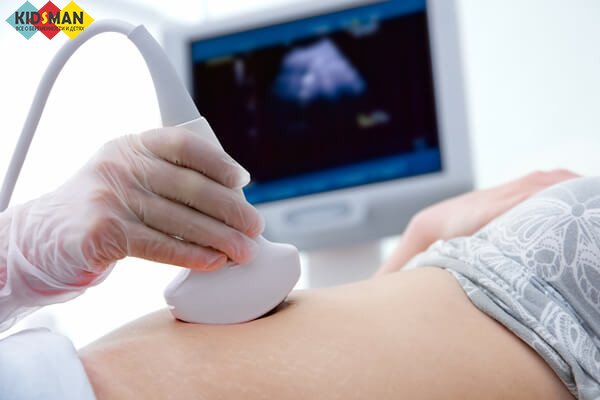
The doctor will prescribe tests and an ultrasound procedure if necessary
Tests at 28 weeks of pregnancy
If the mother has a negative Rh factor, an antibody test is mandatory. It is needed in order to understand whether there is a risk of formation of Rhesus conflict. This situation always has a bad effect on the birth process. If the situation requires medical intervention, the patient is given a vaccine that prevents the synthesis of antibodies from the woman’s body to the fetus.
Already familiar and familiar blood and urine sampling is mandatory. At week 28, a clinical analysis of sugar and hemoglobin levels is also taken. From the beginning of the 3rd trimester, urine is given 2 times a month, on the same day as a visit to the gynecologist.
Ultrasound
At this time, the ultrasound examination procedure is prescribed individually. If the pregnancy is progressing normally, there are no complications, there is no need to perform an ultrasound. The second mandatory procedure is a thing of the past, and the next one is at 32 weeks.
If there is a suspicion of a frozen fetus or a risk of premature birth, an examination is necessary. The doctor will assess the general condition of the placenta and the baby, and its compliance with its gestational age.
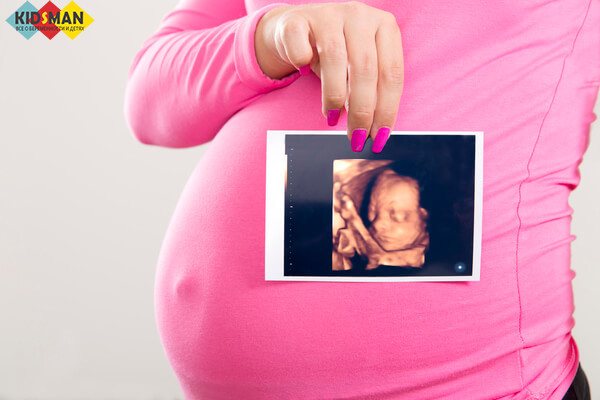
3D diagnostics are very colorful
Stomach
At 7 months my belly has grown noticeably and is difficult to cover with clothes. It is recommended to actively care for your skin - apply moisturizers to your stomach, chest and thighs twice a day after showering. You can use a budget option - slightly warmed vegetable or olive oil.
This will help prevent the appearance of stretch marks - purple stripes, which are then very difficult to get rid of. In addition, an unpleasant phenomenon is accompanied by itching and the desire to constantly scratch areas of the skin.
Uterus
The uterus continues to grow and increase in mass. Parameters at week 28: distance from the navel - 8 cm, from the symphysis pubis - 28 cm. What is characteristic of the uterine cavity now? Many women are frightened by the onset of so-called “training contractions.”
There is no need to panic - these barely noticeable contractions do not in any way affect the health of the mother and the unborn baby, moreover, they are completely painless. This is a kind of preparation of the female body for the upcoming birth.

Swimming is very good for the body
You only need to worry if contractions are accompanied by discharge (bloody or clear) and pain. This may be the first alarm bell about the risk of premature birth.
Sex
The issue of intimacy is acute for many couples during pregnancy. Frightening stories about harm to the unborn baby are simply a myth that has no serious basis. Intimacy is even necessary - in the process, the hormone of happiness - endorphin - is released into the woman’s blood, which is passed on to the baby.
The only thing that is important is to choose a suitable position, without putting pressure on the stomach. However, there are situations with contraindications - if pregnancy occurs with complications, there is a threat of premature birth or other serious reasons.
Risks at 28 weeks
There is also a risk of premature birth this week - the rapidly growing baby puts pressure on the cervix and can contribute to its early dilatation. When lifting heavy objects, sudden movements, or for no apparent reason, rupture of the membranes may occur with the release of amniotic fluid and the onset of labor.
The same reasons can cause premature placental abruption - this is the most dangerous condition - the supply of oxygen to the baby is disrupted and he may die.
There is also a significant risk of infection of the fetus, which is associated with decreased immunity during pregnancy, and constantly recurring colpitis against this background.
Childbirth at 28 weeks of pregnancy
If your baby suddenly decides to be born prematurely, with proper medical care and the use of equipment, the chance to fully develop next to his mother is quite large. All internal organs and systems of the baby are already fully formed and ready to function independently, without the “control” of the mother.
As for the woman’s condition, premature birth can cause serious damage to health: bleeding may occur during and after delivery, cervical ruptures, and early breaking of water. This is all explained by unprepared birth canals, weak contractions and pushing.
Important at 28 weeks
Don't forget to wear a bandage - it will help avoid pressure from the baby's head on the neck and prevent it from opening early. The bandage will also relieve your back and reduce discomfort. It is not recommended to wear a bandage only for women whose baby is not in the correct (head) presentation.
Avoid sudden movements, heavy lifting and intense physical activity.
Choose loose-fitting clothes made from natural fabrics. Shoes have small wide heels. If you are prone to varicose veins, ask your doctor to help you choose compression garments that you will need to take with you to the maternity hospital.
Dimensions of the baby at 28 weeks of pregnancy
At 28 weeks, the baby is about the size of a butternut squash.
At week 28, your Baby is 33-34 cm tall and weighs 900-1000 g. Your Baby:
- distinguishes between taste and smell, since the smells of all products and substances that enter the mother’s body reach the child. Like all children, babies prefer sweet tastes before birth. And at the same time, they are in solidarity with their mother: if the mother prefers meat dishes seasoned with hot sauces, the Baby also gets used to them. But maybe now is the time to instill in him a healthy taste?
- the eyelids open, and the Baby becomes able to blink.
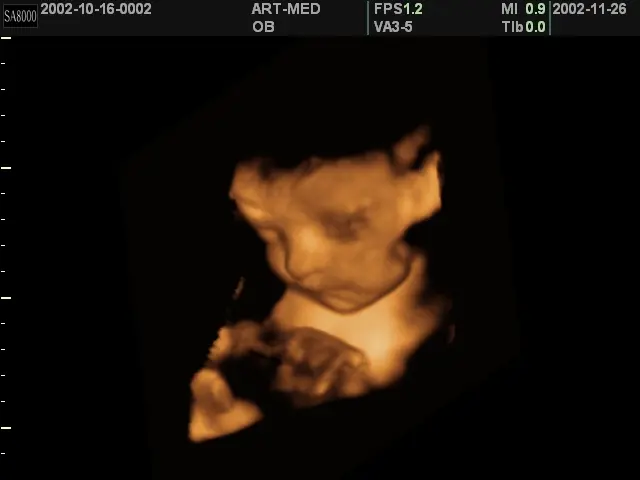
Ultrasound at 28 weeks of pregnancy
Nutrition at 28 weeks
Eat not for two, but for two. The contents of your plates should be healthy and balanced. Be sure to include fresh and thermally processed vegetables and fruits in your diet - they will help normalize intestinal function. It is best to drink clean, non-carbonated water, compotes, fruit drinks, and green tea. Save coffee and carbonated drinks until you stop breastfeeding.
Forget about fast food, alcoholic drinks and store-bought canned goods - they can cause irreparable harm to your child.
What is allowed and what is prohibited during pregnancy?
The treatment process is a crucial moment for every woman. The fact is that while carrying a baby, you cannot take many medications that you would have previously used even without a doctor’s permission.
Here is a list of several drugs contraindicated in the treatment of acute respiratory viral infections at week 28:
- Aspirin and drugs based on it.
- Antibiotics and other potent medications.
- Naphthyzin.
- All kinds of biologically active additives.
- Any medicine based on chemicals.

It is strongly NOT recommended to use various dietary supplements for the treatment of acute respiratory viral infections during pregnancy
If a woman gets sick with ARVI at 28 weeks of pregnancy, she should pay attention to the following medications:
- Decoctions of chamomile, sage, eucalyptus.
- Drops of Aqua Maris or Pinosol.
- Vitamins.
- Some homeopathic remedies.
- Doctor Mom against cough.
We also recommend: ARVI at 32 weeks of pregnancy
Although even the safest products may also be contraindicated during this period due to individual intolerance to the components or because they can cause an allergic reaction.
In any case, it is worth making an appointment with your doctor and finding out all the details of the safe treatment of colds while pregnant.



